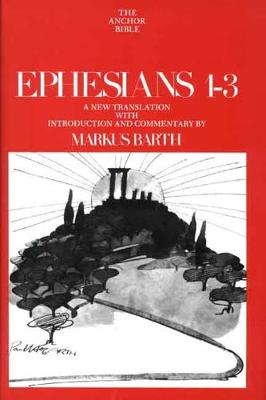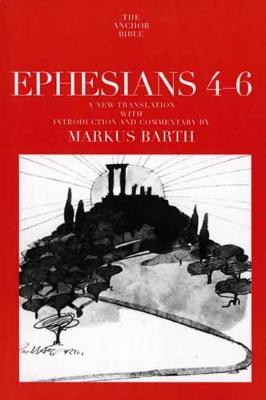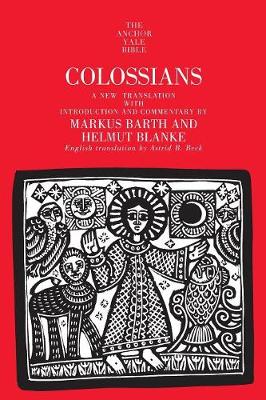Anchor Bible Commentary (YUP)
3 total works
Encompassing the body of Pauline theology, Ephesians (volumes 34 and 34A of the acclaimed Anchor Bible series) has been called "the crown of St. Paul's writings," yet both its authorship and addressees are the subject of continuing dispute. Through line-by-line examination of its vocabulary, its difficult style, its Qumran and Gnostic affinities, its parallels with and distinctions from the undisputed Pauline corpus, its use of the Old Testament, and its dialogue with orthodox and heretical Judaism, Markus Barth demonstrates that Paul was almost certainly the author. And, after exploring previous explications of this hymnic and admonitory epistle in detail, he concludes that it was intended for Gentile Christians converted after Paul's visits to Ephesus.
On this basis, Barth reexamines the relationship between Israel and the church, discounting the thesis that Ephesians suggests an "early Catholic," or high-ecclesiastic or sacramental doctrine. Instead, he finds in this letter a statement of the social reconciliation which conditions the salvation of the individual. And reevaluating the section describing the relation between husband and wife, he offers an alternative to the traditional notion that Paul degrades women or belittles their rights and their dignity.
In these two volumes Barth has followed the structure of Ephesians: upon the praise of God (chapters 1-3) are based the admonitions (chapters 4-6). But just as the epistle is an integral whole, so is the author's commentary. Through his special understanding and love of the apostle Paul, Markus Barth reopens to modern man the ancient message of love, worship and joy.
Ephesians comprises volumes 34 and 34A of the Anchor Bible, a new book-by-book translation with introductions, notes, and comments by individual scholars, each known for outstanding contributions to biblical studies. Markus Barth, son of Karl Barth, held a New Testament chair at the University of Basel, Switzerland.
Encompassing the body of Pauline theology, Ephesians has been called "the crown of St. Paul's writings," yet both its authorship and addressees are the subject of continuing dispute. Through line-by-line examination of its vocabulary, its difficult style, its Qumran and Gnostic affinities, its parallels with and distinctions from the undisputed Pauline corpus, its use of the Old Testament, and its dialogue with orthodox and heretical Judaism, Markys Barth demonstrates that Paul was almost certainly the author. And after exploring previous explication of this hymnic and admonitory epistle in detail, he concludes that it was intended for Gentile Christians converted after Paul's visits to Ephesus.
On this basis, Barth reexamines the relationship between Israel and the Church, discounting the thesis that Ephesians suggests an "early Catholic" or high-ecclesiastic or sacramental doctrine. Instead, he finds in this letter a statement of the social reconciliation that conditions the salvation of the individual. And reevaluating the section describing the relation between husband and wife, he offers and alternative to the traditional notion that Paul degrades women or belittles their rights and their dignity.
In these two volumes Barth has followed the structure of Ephesians: upon the praise of God (chapters 1-3) are based the admonitions (chapters 4-6). But just as the epistle is an integral whole, so is the author's commentary. Through his special understanding and love of the apostle Paul, Markus Barth reopens to modern man the ancient message of love, worship, and joy.
The Apostle Paul's Letter to the Colossians offers a valuable and intimate glimpse into the life of a fledgling Christian community as it struggled to define Christian doctrine and theology. Paul was prompted to write to the Colossian assembly when he heard that "false teachers" had joined the congregation and were advocating dangerous, non-Christian practices. In an effort to appear superior, these heretical teachers were luring Christians to exercise asceticism, moral rigorism, and esoteric rituals-hallmarks of other "mystery" and pagan cults. In his passionate letter, Paul denounces these extreme and elitist practices and firmly defends a life in Christ. He proclaims that pure, simple worship of Christ alone is the most powerful statement of faith.
In their astute and lucid commentary, eminent New Testament scholars Markus Barth and Helmut Blanke re-create the turbulent age of the birth of Christianity and examine the myriad "outside" influences-from cold, rational Hellenistic philosophy to exclusive, ethereal Gnostic thought-that often threatened the evolution of Christian theology. Colossians not only provides a new and carefully balanced analysis of this pivotal New Testament text but also chronicles the development of Christian thought as it gradually spread throughout the Roman Empire.


